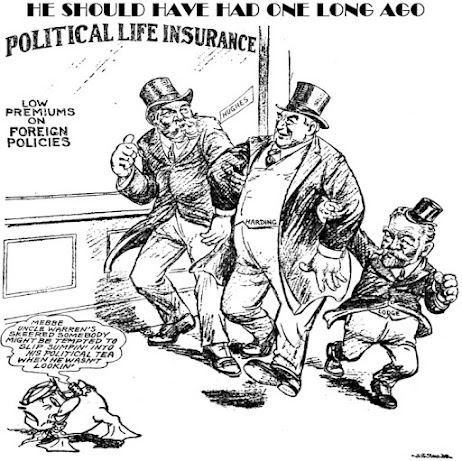Our Saturday Graphical History Tour returns to the thrilling days of January, 1923.
Chief among issues interesting the political cartoonists of the day was the French government's insistence upon extracting punitive reparations from Germany for the cost of World War I. The German government complained that it couldn't possibly afford to pay the Entente powers reparations at that level, to which France responded that if Germany didn't make an overdue installment payment of 50 billion marks by a January 15 deadline, the French army would attack.
 |
| "Die (Death) Wacht Am Rhein" by Elmer Bushnell for Central Press Assn., ca. Jan. 3, 1923 |
Elmer Bushnell drew some two dozen cartoons about Franco-German tensions in the month of January alone. Most of them, in common with those of most other American cartoonists, are sympathetic to Germany's predicament and critical of France, in spite of the U.S. having fought alongside the French against Germany during the war.
 |
| "A Poor Way to Get Milk" by Rollin Kirby in New York World, ca. Jan. 16, 1923 |
France and Belgium did indeed send troops into the Ruhr valley on January 11 to seize control of mining and timber industries. They met with no resistance from the essentially disarmed German army, although it was an entirely different matter with the German citizenry. Passive resistance and civil disobedience included strikes by coal miners and sabotage of trains and factories; French occupation would not be bloodless.
 |
| "No Doubt France Will Succeed" by Wilfred (aka William F.) Canan in Minneapolis Star, Jan. 23, 1923 |
I've come across a few cartoons in January of 1923 rehashing shopworn accusations that Germany was derelict in meeting its reparation obligations, but the vast majority blamed France for the escalation of hostilities. The last thing anyone in the U.S. wanted to see, whether isolationist or internationalist, was a return to war in Europe.
 |
| excerpt from "The Changing World" by John McCutcheon in Chicago Tribune, Jan. 21, 1923 |
The British government wasn't eager to scrap the armistice of 1918, either. John McCutcheon notes the traditional rivalry between England and France, and also points out how worthless the Deutschmark had become. (I have edited out two panels devoted to Chicago politics.)
 |
| "Somebody Else Has Grown Tired of It" by J.N. "Ding" Darling in Des Moines Register, Jan. 6, 1923 |
"Ding" Darling, no fan of isolationism, nevertheless concedes its appeal. He could only guess at its effectiveness between the wars then, and amid Brexit now.
 |
| "However, the Size of the Dose May Be Reduced" by William K. Patrick in Fort Worth Star Telegram, Jan. 3, 1923 |
Here I'd like to point out that the fellow with the waxed mustache had long been the standard American character to represent France, rather than the Marianne more common in European cartoons. (And the duck is a feature in all of W.K. Patrick's editorial cartoons.)
Returning to Elmer Bushnell's cartoon above, it's notable that he decided not to employ the stereotypical bear to represent Russia. Of course, a French rooster wouldn't be very threatening to the German mouse, relatively speaking. But I suppose Bushnell could have drawn two bears, hearkening back to France's Bourbon kings, whose anthem was better known to American children of Bushnell's era as "The Bear Went Over the Mountain."
 |
| "He Should Have Had One Long Ago" by W.K. Patrick in Fort Worth Star-Telegram, Jan. 12, 1923 |
I'll give W.K. Patrick one more shot today by virtue of the uncanny coincidence that President Harding would not survive the summer.
 |
| "Congress Has Tied My Hands" by Nelson Harding in Brooklyn Daily Eagle, Jan. 8, 1923 |
Critics of Harding's administration regarded his policy of leaving European affairs in the hands of Europeans weak and feckless. Republicans in Congress (and several Democrats) were indeed opposed to any further American involvement Over There; the GOP's legislative majority had been drastically cut in the 1922 election, although the lame duck 67th Congress was still officially in session throughout January and February.
 |
| "Au Revoir" by Clifford Berryman in Washington (DC) Evening Star, Jan. 12, 1923 |
The day before France's invasion, the Harding administration announced that U.S. military personnel would immediately return home from the Rhineland, a move of which hardly anyone on this side of the Atlantic disapproved...
 |
| "Our Rhine Soldiers Are Grieved..." by Elmer Bushnell for Central Press Assn., ca. Jan. 12, 1923 |
...although, for various reasons, some of our servicemen might have been less than thrilled to leave.
Next week: The German cartoonists weigh in. And whom they are pissed off at may surprise you.
No comments:
Post a Comment